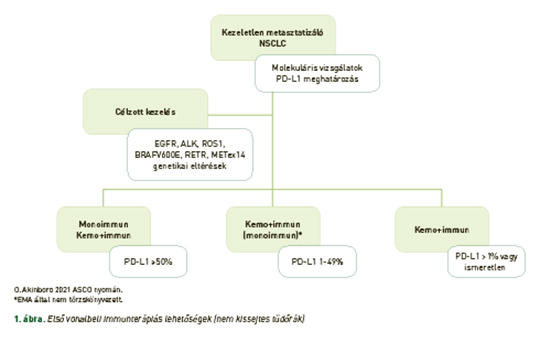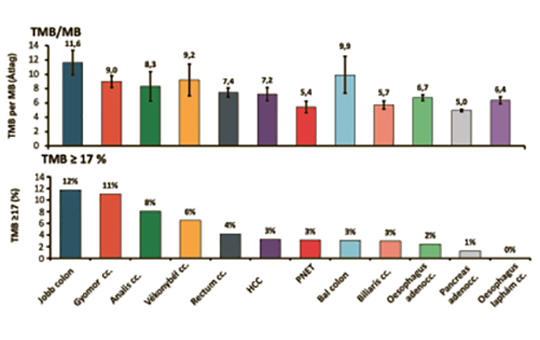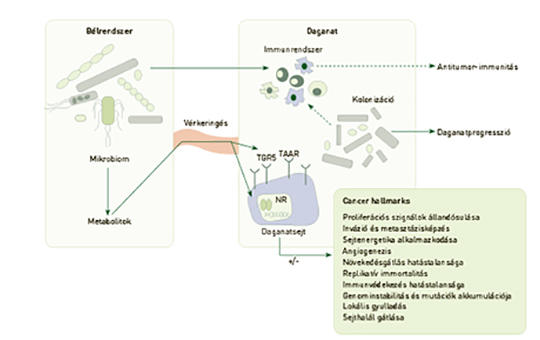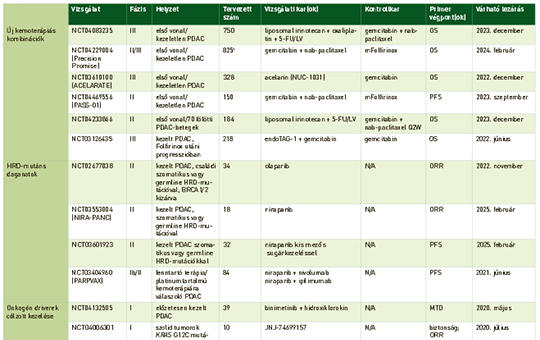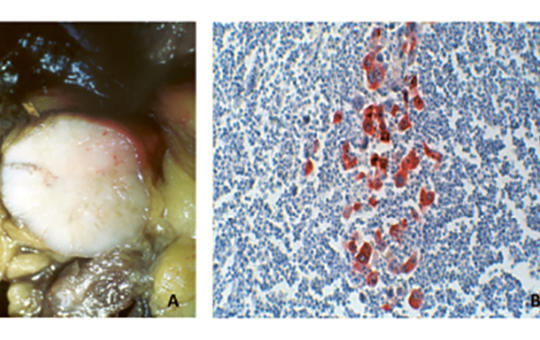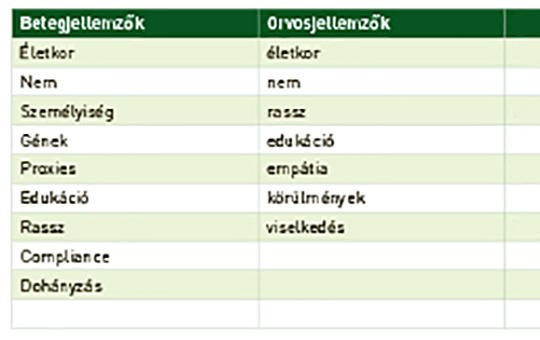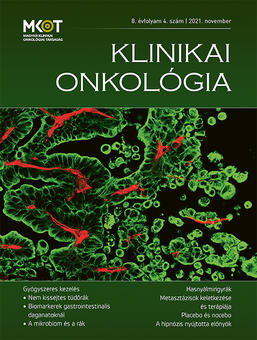The eLitMed.hu medical portal uses computer cookies for convenient operation. Detailed information can be found in the Cookie-policy.
Clinical Oncology - 2021;8(4)
Content
[Gastrointestinal cancers: role of biomarkers and based on driven treatment of gastrointestinal cancers]
[Remarkable advancements in techniques of genomic profiling and bioinformatics have led to the precision medicine in oncology approach, targeted therapy and immune checkpoint inhibitors achieved radically change in treatment efficacy based on accumulation of knowledge on the genomic profiles of gastrointestinal tract cancer (GI). Advanced or disseminated poor risk GI cancer patients have had a better chance for that progression free and/or overall survival. Highly effective treatment needs to incorporate numerous molecular characteristic into clinics – expression of PD-L1, MSI (micro satellite instability)/dMMR (defective mismatch repair), TMB (tumor mutation burden), resistance mutation, insertions/deletions and other genomic alterations. This review aims to summarize predictive and prognostic biomarkers might suggested for precision oncology treatment of GI cancers.]
[Microbiome and cancer]
[Most compartments and organs of the human body are not sterile, bacterial DNA and RNA can be detected using next generation sequencing techniques. All bacterial DNA in a compartment is called the metagenome, all bacterial transcripts are termed metatranscriptome, while all bacterial species is coined the microbiome. The microbiome transforms in neoplastic diseases that is called the oncobiome. Most tumors are colonized by bacteria that supports tumor growth and development. Microbiome compartments distant to the tumors (as the microbiome of the gastrointestinal tract) can also undergo oncobiotic transformation. The metabolic capacity of the oncobiotic microbiome in the gastrointestinal tract is suppressed and the production of a large set of cytostatic and antimetastatic bacterial metabolites is blunted supporting cancer cells proliferation and metastasis. The microbiome of the gastrointestinal tract has pivotal role in setting the tolerance of the immune system against cancer cells, therefore, has prime importance in tumor immunity. Oncobiosis, by itself, cannot induce tumors, but can support tumor growth and metastasis formation. Bacteria have key role in the success of cytostatic therapy and in setting the side effect profile.]
[Mechanisms of metastasis formation as potential therapeutic targets]
[The end-stage of the tumor progression is the development of the metastatic disease. The biological basis of this progression is well known, however the exact molecular background of it is not. In this process the metastatic cancer cells develop maximal adaptation to extreme environmental clues and collaborative potential with wide array of host cells, accordingly the metastatization takes place in an organ specific manner. The metastases are different from the primary tumor but from each other as well, and this true for their genetic background as well. The ultrasensitive monitoring of this process is possible with the use of liquid biopsy and molecular tests. Till we don’t have organ metastasis specific therapeutic modalities similarly to bone metastases, the available modalities must be fine-tuned for metastatic disease and not for the primary tumor. ]
[The concept and use of placebo and nocebo in oncology]
[Placebo and nocebo effects recognised through all of the history of medicine, and these effects can be found also in the field of oncology research and clinical practice. Placebo effect are more than the effects of an inert substance. Placebo benefits the health status because of the person’s belief and nocebo worsens the health status of the patient. Several psychological mechanisms are involved in placebo/nocebo effects; expectation, learning processes (classical conditioning and observational learning), reinforced expectations, personality traits of the patient and the health care provider. At the same time placebo effects rely on neurobiologic mechanism (neurotransmitters like dopamine, cholecystokinin, opioids and activation of specific brain areas). The use of placebo is an important methodological tool in oncological research and drug development. Inert substance can be associated with positive (placebo) and negative (nocebo) adverse event profiles also can modify the measured therapeutic effects in randomized clinical trials.]
[Health benefits of a widely available form of hypnosis – based psychological support at each stage of the oncology clinical pathway]
[Over the past three decades, several studies adopting a complex biopsychosocial approach to disease and medicine examined the health benefits of hypnosis-based techniques at various stages of the oncology clinical pathway. The obtained findings consistently demonstrate that the psychological support provided in hypnosis has measurable and replicable benefits in improving oncological patients’ quality of life by reducing the distress, pain and adverse effects accompanying various oncological conditions and their treatments. However, the psychological support offered by hypnotherapy has not to date been integrated into standard oncological protocols generally available to the affected population, which is in large part due to a lack of adequate human and financial resources. As a result of a recent Hungarian innovation project, the hypnotherapy-based free software application Hipnoword has been developed, whose purpose is to offer widely available and replicable psychological support for oncological patients at each stage of the oncology clinical pathway. The available reports on the application of hypnosis in oncological care suggest that hypnosis-based techniques not only contribute to positive health outcomes but also raise questions that deserve further empirical investigation. The Hipnoword application provides not only free support for oncological patients but also a useful instrument for clinical research on the health benefits of hypnotherapy.]
1.
Clinical Neuroscience
Is there any difference in mortality rates of atrial fibrillation detected before or after ischemic stroke?2.
Clinical Neuroscience
Neuropathic pain and mood disorders in earthquake survivors with peripheral nerve injuries3.
Journal of Nursing Theory and Practice
[Correlations of Sarcopenia, Frailty, Falls and Social Isolation – A Literature Review in the Light of Swedish Statistics]4.
Clinical Neuroscience
[Comparison of pain intensity measurements among patients with low-back pain]5.
Journal of Nursing Theory and Practice
[Fear of Falling among Geriatric Patients: a Narrative Review]1.
2.
3.
4.
5.
